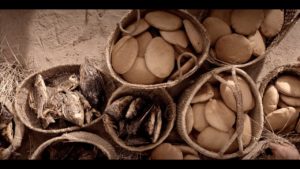Mark 6:30-441NIV New International Version Translations
30 The apostles gathered around Jesus and reported to him all they had done and taught. 31 Then, because so many people were coming and going that they did not even have a chance to eat, he said to them, “Come with me by yourselves to a quiet place and get some rest.” 32 So they went away by themselves in a boat to a solitary place. 33 But many who saw them leaving recognized them and ran on foot from all the towns and got there ahead of them. 34 When Jesus landed and saw a large crowd, he had compassion on them, because they were like sheep without a shepherd. So he began teaching them many things. 35 By this time it was late in the day, so his disciples came to him. “This is a remote place,” they said, “and it’s already very late. 36 Send the people away so that they can go to the surrounding countryside and villages and buy themselves something to eat.” 37 But he answered, “You give them something to eat.” They said to him, “That would take more than half a year’s wages ! Are we to go and spend that much on bread and give it to them to eat?” 38 “How many loaves do you have?” he asked. “Go and see.” When they found out, they said, “Five—and two fish.” 39 Then Jesus directed them to have all the people sit down in groups on the green grass. 40 So they sat down in groups of hundreds and fifties. 41 Taking the five loaves and the two fish and looking up to heaven, he gave thanks and broke the loaves. Then he gave them to his disciples to distribute to the people. He also divided the two fish among them all. 42 They all ate and were satisfied, 43 and the disciples picked up twelve basketfuls of broken pieces of bread and fish. 44 The number of the men who had eaten was five thousand.
 Background
Background
This Gospel text begins with an account of the disciples’ return after they had been previously sent out by Jesus in Mark 6:6-13, and follows the unpleasantness of John’s beheading described in Mark 6:14-29.
In verse 31 Jesus tells the disciples to get away by themselves to rest. No doubt this message says something about the importance of rest or maybe even the importance of the Sabbath. But immediately, as the verses continue in verses 33-34, Jesus and the disciples get very little rest. This story is about the disciples having been out on their own, now come back together with Jesus. It may be a small point, but the success of the disciples in their ministry is not measured simply by how much they accomplished but by how much they have learned.
Mark 6:34 begins with a large crowd that interferes with Jesus’ and the disciples’ plan for a little rest, but still Jesus has compassion on them. The Greek word used here is splagchnizomai, denoting sympathy, mercy, and loving concern. Why does Jesus have compassion on them? “Because they were like sheep without a shepherd.” That is such a vivid and powerful image. Most of us at one time or another feel the same way. We know Jesus to be the Good Shepherd and if that is the case, then what we see is Jesus showing compassion to these “shepherdless” sheep. Jesus does not launch into healing but says in Mark 6:34, “He began teaching them many things.” What we are seeing here is a living definition of the term, “ministry.” It begins with attending to the immediate physical needs people have, and then educating them by clearly and faithfully by sharing the Gospel’s message of good news.
The people were seeking the spiritual food of Jesus’ words, but He also took care of their need for bodily food. This miracle shows that Jesus came into the world, not only to restore, but to preserve and nourish both people’s spiritual life as well as their physical life. In Jesus, there is enough for all that stop, listen and follow Him. None were sent away empty in this story. Though Jesus, He had bread and fish at His command. Jesus also would teach us not to waste any of God’s bounties, remembering how many are hungry in our world.
Items for Discussion
- Why do you think it is so important to include the physical needs of those we wish to share the Gospel’s message into our planning?
- What kinds of things can we all do with those around us to follow Jesus’ example?
- Why do you think Jesus asked the disciples to give them something when He knew they wouldn’t have been able to?
- What can we learn from the boy who gave them?
- What did Jesus do when He saw His plans had been messed up? Is there anything we can learn from Jesus’ attitude here?
- Why is rest important for those involved in ministry? What should our role be?
Discussion Challenge
- Based on this story in Mark, would you change the Church’s ministry to our communities around us? How?
- 1NIV New International Version Translations
